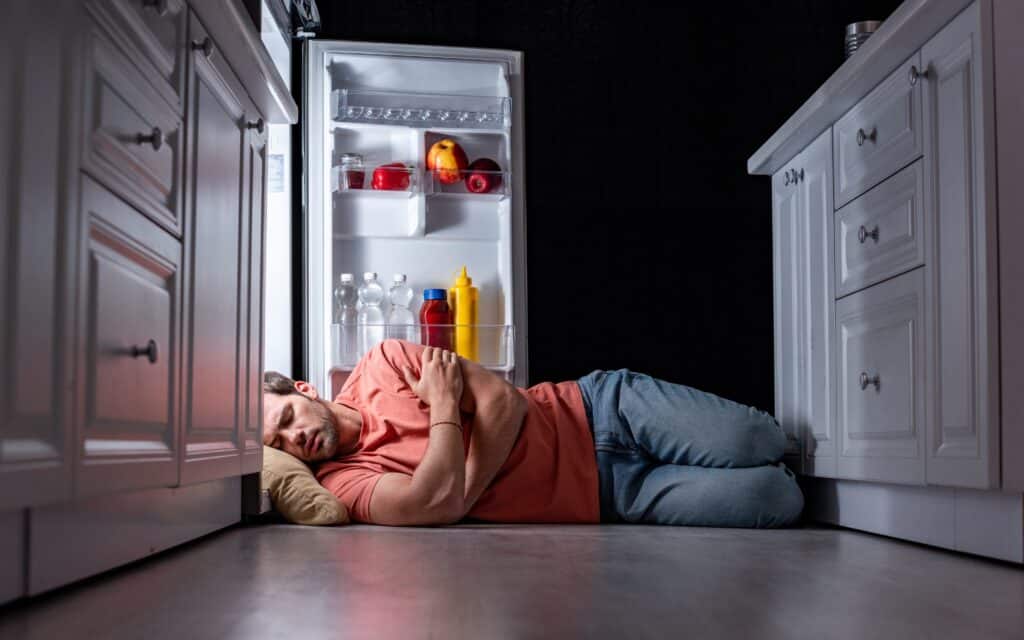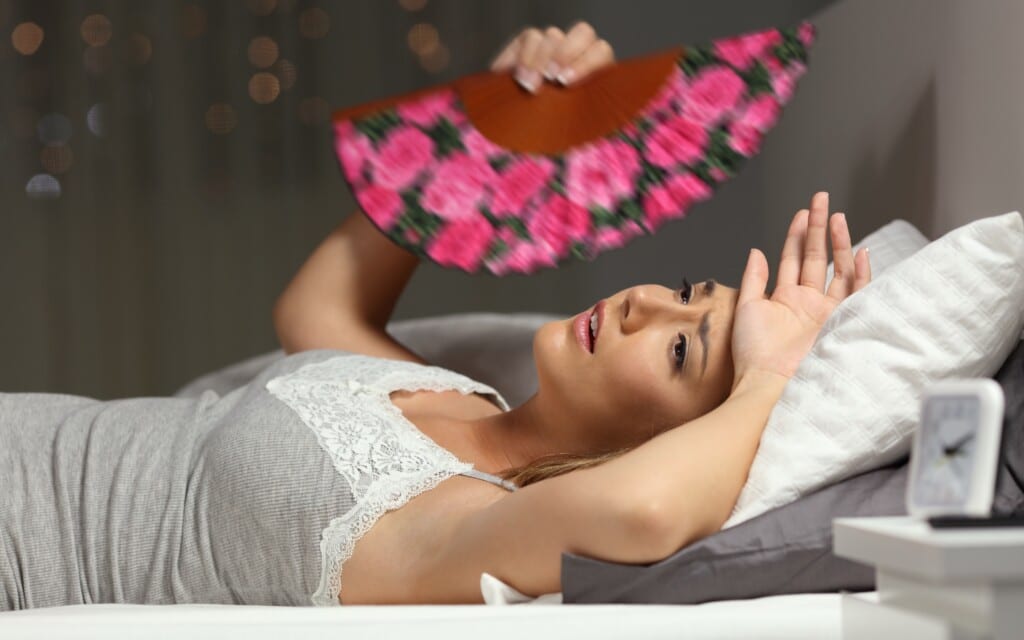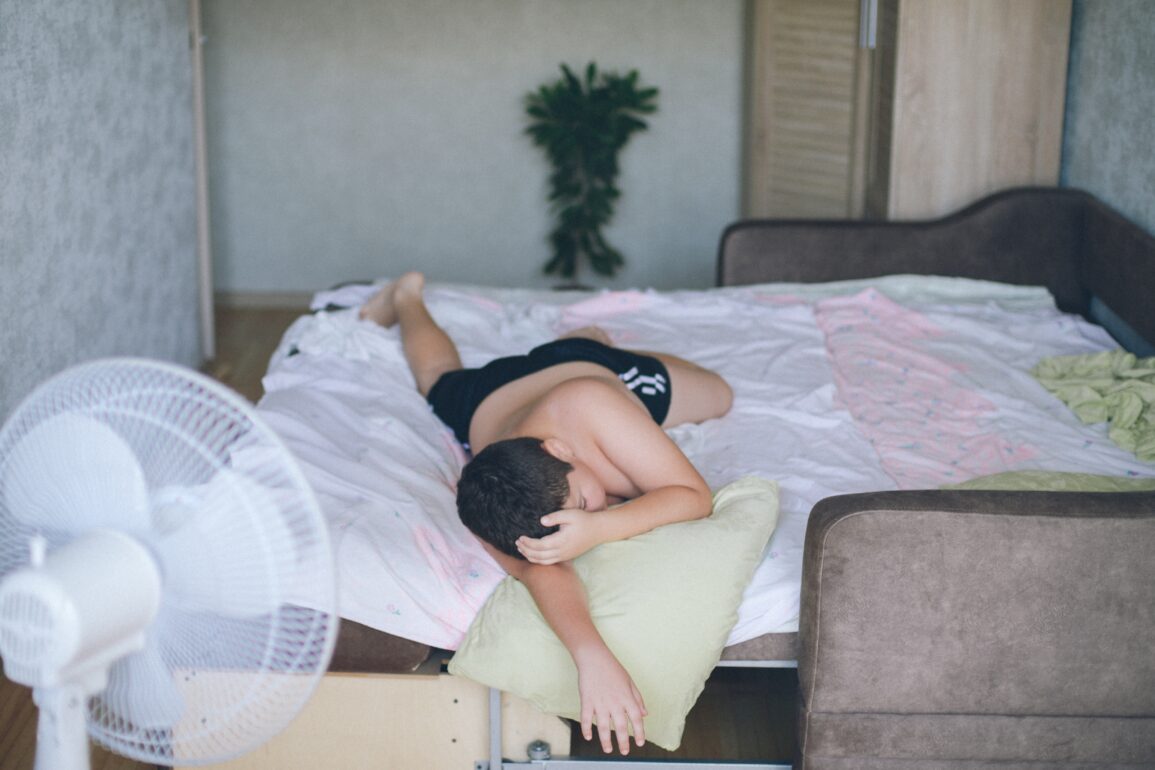Too hot to sleep?
You’re not alone.
Most people love the summer for the warm weathers, garden parties and beach trips.
Unfortunately, when the time comes to snuggle down for the night, it’s hard to get cool in a roasting hot bedroom. Since your temperature can significantly increase your risk of insomnia, it’s easy to see how people get frustrated.
Human beings have an ideal temperature setting for sleep, and the cooler you are, the more likely it is you’ll drift off. When you’re overly hot, you spend the night tossing, turning, and sweating – which isn’t great for a good night’s rest.
Here’s your guide on how to sleep in the heat.
Why is it hard to sleep in the heat?
The temperature of both your bedroom and your body has a massive impact on your ability to fall asleep. When you’re about to fall asleep, the human body produces a crucial chemical called melatonin.
This substance helps with a range of sleep cycle activities, including reducing your body temperature to the ideal point for sleep.
If your room’s ambient temperature, or your body temperature is too high, the natural sleep cycle is disrupted. You’re less likely to drift off into a steady sleep.
Your body needs to be a little cooler before it can reach the stage of “deep sleep” – in this stage your body does most of its restorative work.
If the temperature is too high, your brain can’t tell whether it’s a good time to sleep or not. This affects the quality of your rest.
Being overly warm means you’re also more likely to sweat during the night. You end up damp, sticky, and uncomfortable. The irritation of lying in your own sweat causes you to toss and turn in the search for a better position.

How to sleep in the heat: tips for hot sleepers
If you’re too hot to sleep, one of the first things you should be doing is looking for ways to cool your body. If your core temperature runs hot, you’re going to struggle to cool down just enough for sleep.
Think about taking a shower or bath before bedtime. Doing this tricks your body into thinking your room is cooler than it is. Plus, a hot shower or bath is excellent for relaxation.
Other strategies to cool your body for sleep include:
Applying a cold compress
Don’t just throw your cold compress anywhere, press it to your pressure points on the back of your neck, your wrists, inner elbows, and behind the knees.This will help to reduce the sensation you’re overheating.
Drink some cold water
Replace alcohol like a can of beer or glass of wine with a cold glass of water at the end of the day. Alcohol can cause you to feel warmer, while a glass of water will hydrate your body and make you feel more refreshed and cooler.
Change your bedding
Switch to a lighter duvet for the summer months with a lower tog level or consider just using a thin blanket instead. It’s also worth using breathable bed linen which isn’t as likely to trap your body heat.
Rethink the memory foam
As wonderful as memory foam mattresses and pillows can be, they’re also much more likely to trap in excess heat. Switch to a hybrid or spring-based mattress that will make it less likely you’ll sink into your bed.
Forget the nightwear
You don’t really need to wear PJs to bed. Sometimes, going all-natural is the best way to protect yourself from overheating. If you do need to wear some clothes, keep them light and breathable.
Relax before bed
Meditation and other relaxation practices before bed are an excellent way to slow your heart rate, and your temperature. Try finding a routine which allows you to unwind fully before going to sleep.
How to cool down a room: Bedroom fans and beyond
Sometimes, it’s not your body heat that’s the problem, but the ambient temperature of your bedroom. If this is the case, you’ll need to look for ways to make your room cooler.
This could start with opening the windows and doors to your bedroom, so air can circulate.
Turn on the ceiling fan
If you haven’t invested in a ceiling fan until now, this could be the perfect reason to do so. A ceiling fan helps to circulate air around the room and give you a blast of cooler air where you need it most.
Avoid ceiling lights
Ceiling lights and other forms of electricity, including your television, can heat up a room. Keep the electronics out of your bedroom so you can reduce the risk of heat emanating from those devices.
Close the blinds early
Closing the curtains and blinds when the sun is high will help to stop the light outside from heating up your room. You can even get sunlight blocking blinds to make this process much easier.
Change the thermostat
If you have an air conditioner, try turning your temperature down to 65 degrees. Most experts agree this is the ideal temperature for sleep. Going to bed at 65 degrees will help you to keep your body at its natural temperature.
Freeze your sheets
If you’re feeling extra heated one day, shove your pillowcase and sheets in the freezer for a while, then put them on your bed. This can be an excellent way to give you an extra dose of coolness when you snuggle down for the night.
Use a bedside fan
Either as a supplement to, or instead of your ceiling fan, your bedside fan can direct cool air towards you when you need it. Look for a low-noise, low-electricity option to minimize disruption and keep energy costs low.

Other ways to sleep in the heat
If, after using the techniques above, you’re still too hot to sleep, and you need to find out how to cool down a room fast, there are still a handful of options available.
You could consider using damp towels dipped in cold water to help your body relax if you’re seriously overheated. Alternatively:
Use ice packs
Ice packs aren’t just for injuries, they can also be a wonderful way to reduce your body temperature fast, Just make sure you’re using them correctly by following the instructions on the packaging.
Keep ice water beside your bed
Another option is to bring a glass of ice water to bed with you. This will keep you hydrated during the night. You can also suck on the ice cubes or ice chips to reduce your temperature when you’re dozing off.
Try sleeping on the ground
Although sleeping without your mattress might not seem like fun, heat does rise. Sleeping lower to the ground could be an excellent way to reduce your overall body.
Change your sleeping location
If you really can’t sleep in your bedroom, it might make sense to go downstairs and try snoozing on the couch instead. This can be a good option when you’re trying to avoid the heat rising into your bedroom.
Cast off all the bedding
Forget bedding, clothing, and everything else. Sleep completely natural, and leave the windows open too. It might feel a little odd at first, but the fewer fabrics you have clinging to your skin, the less likely you are to be overwhelmed by the heat.
Remember, it also helps to have a routine each night to ensure you can drop off to sleep soundly as quickly as possible. If you already have insomnia, the stress of feeling like you’re not going to be able to sleep can be enough to make you feel warmer, and less likely to fall asleep.
If you struggle with insomnia, don’t wait until your issue gets too hot to handle to seek out help. Speaking to a doctor will help you to determine the root cause of your problem, so you can potentially find a solution.
Siestio. Sleep Matters.
General advice disclaimer
This article contains general tips and advice. However, no diet or exercise program should be started without consulting your physician or other industry professional first. For more information read our full disclaimer here.







